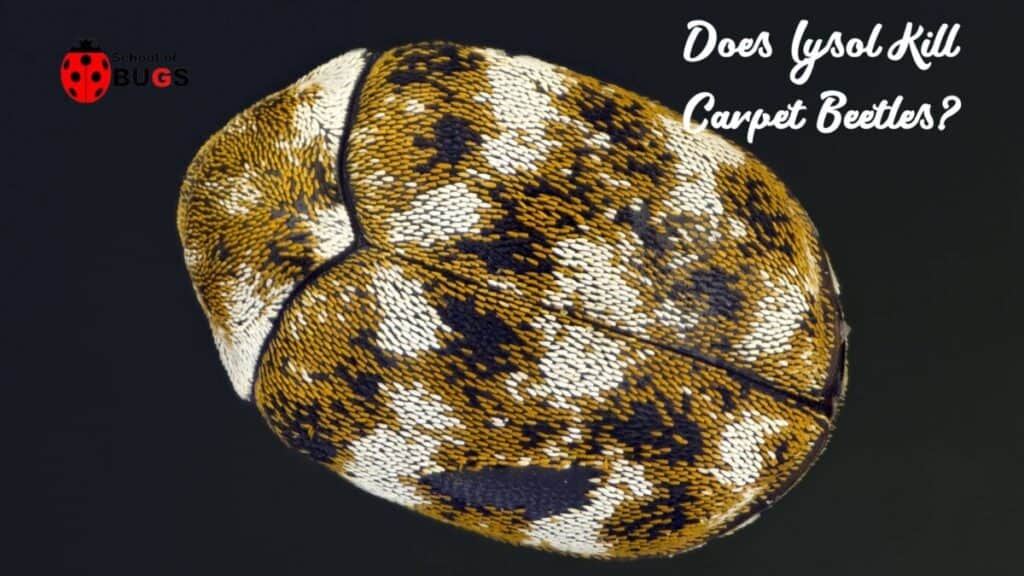
If there’s one universal rule of homes, it’s that bugs don’t belong. When you spot a carpet beetle, your first inclination might be to reach for the nearest can of Lysol disinfectant spray, but does Lysol kill carpet beetles?
Lysol will not kill carpet beetles on contact but can interfere with their ability to breathe and incapacitate them. When it comes to clearing carpet beetles from a home, there are more effective solutions.
Can Lysol Kill Carpet Beetles?
Lysol is a disinfectant consisting of lactic acid, hydrogen peroxide, and isopropyl alcohol. The last ingredient is the most relevant when it comes to killing carpet beetles.
Alcohol is toxic to beetles and will cause them to suffer harm whether they are sprayed or enter an area that has been sprayed with Lysol.
Of course, the concentration of Lysol also influences how much the carpet beetle will be affected by the toxic alcohol. The toxicity of Lysol, however, is not the most dangerous part of it for carpet beetles.
Thanks to its composition, Lysol is quite sticky and tends to cling to the skin. While this does exacerbate the symptoms of alcohol burn, the danger for carpet beetles lies in the risk of asphyxiation.

The sticky Lysol clings to the beetle’s spiracles, small pores over the surface of their body that enable them to breathe and prevent the beetle from absorbing oxygen.
Over time, this can result in the beetle’s death, or, at minimum, cause it to be lethargic. When sprayed, carpet beetles may freeze on contact with the Lysol, appearing as though they have been struck dead, largely because of the effects of the alcohol on their internal organs.
Even while being unable to breathe, carpet beetles can live for another few hours before dying.
What Works Best to Kill Carpet Beetles?
When it comes down to it, Lysol is not your most effective tool in the war on carpet beetles and shouldn’t be used exclusively to deal with a carpet beetle infestation.
It still has merit, of course, in spraying on countertops and other spaces where you would normally use a disinfectant for the purpose of cleaning the space and discouraging carpet beetles from visiting there again.
Vinegar
A more effective way to discourage carpet beetles is vinegar. The acidity of the vinegar is strongly discouraging to carpet beetles, and vinegar has the added benefit of being acidic enough to kill carpet beetle eggs and larvae.
While the smell of vinegar might not be pleasant, it certainly beats having a carpet beetle infestation. White vinegar is the best option to ward off carpet beetles since it can be used on fabric without staining it, allowing you to get in all the nooks and crannies that carpet beetles may be hiding in.
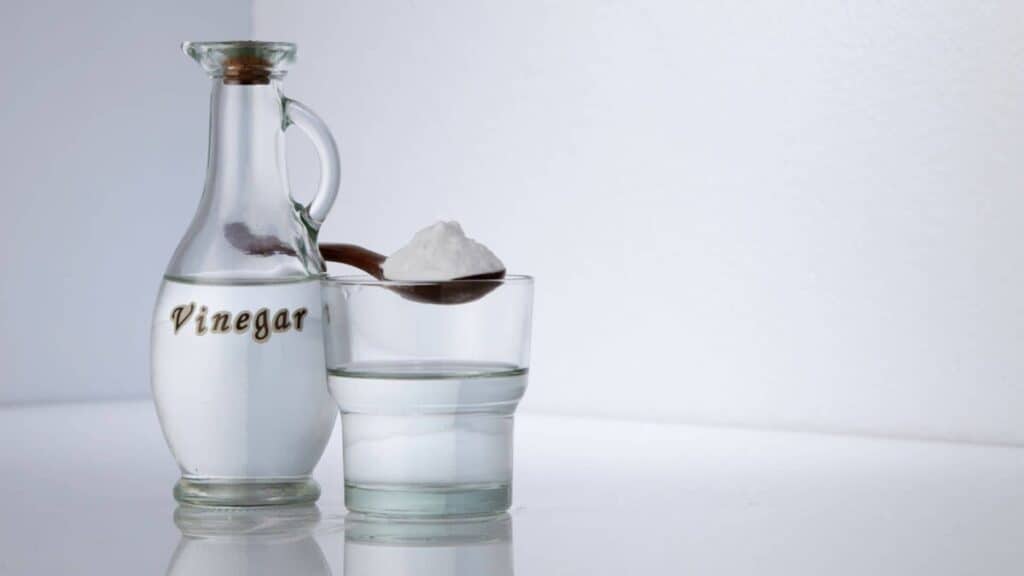
You don’t need to dilute the vinegar; just bottle it and start spraying. Don’t forget to tackle all the little hidey holes that pests love to bunker down in including:
- Carpets
- Cracks in the carpet or walls
- Under chair seats
- In cabinets and cupboards
- Curtains
- Furniture joints
In essence, anywhere that’s dark and warm is an ideal environment for carpet beetles since it gives them a good place to lay their eggs and stay hidden from predators.
Spraying these areas, where appropriate, with vinegar, is a good solution to get rid of carpet beetles, although it’s certainly not a cure-all for a full-fledged beetle infestation.
Diatomaceous Earth
A solution you’ve probably never heard of, diatomaceous earth is a good option if you have pets or kids and want to avoid spraying harsh and toxic chemicals around your home.
This natural pesticide destroys the waxy layer of the larvae’s shell, causing it to dehydrate and die. To use it, all you need to do is sprinkle the powder around problematic areas of your home.
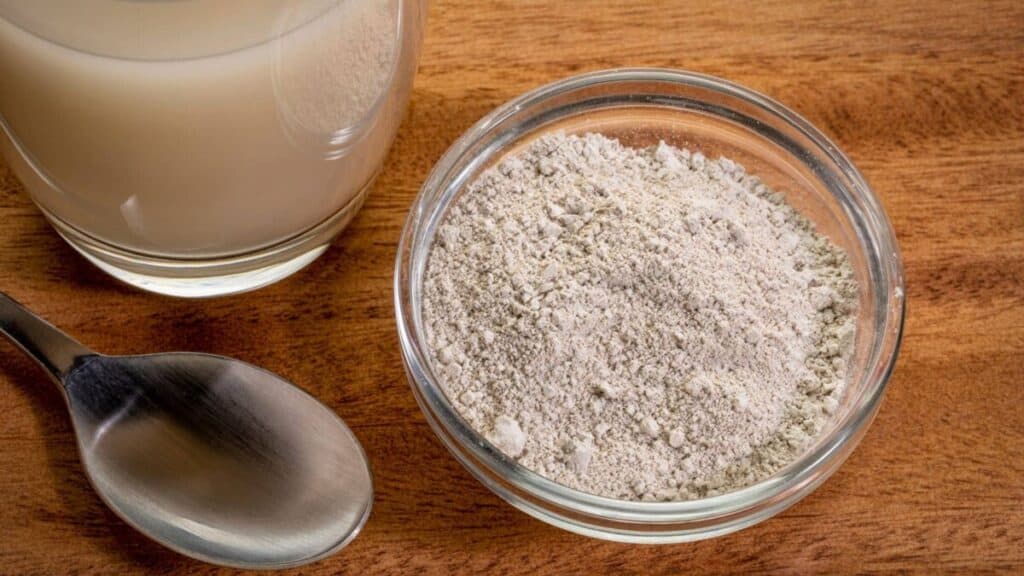
As long as it makes contact with the larvae, diatomaceous earth is a death sentence for carpet beetles.
The disadvantage, of course, is that it only kills larvae on contact, and to use it, you need to sprinkle the fine powder around your home.
You’ll also need to invest in a pretty large bag of the stuff to make sure you’ve got enough to tackle any problem areas around your home.
Cedarwood Oil
In contrast to Lysol and vinegar, cedarwood oil is a three-in-one pesticide. It handles adults and larvae, as well as discouraging any pests from visiting areas that are covered with cedarwood oil.

The oil, much like Lysol, will kill the adults by suffocating them with its clingy nature. The cedarwood oil will also dissolve eggs and larvae on contact.
Best of all, cedarwood oil is a lot less smelly than vinegar as a way of handling carpet beetles around your home.
Simply combine a mixture of 98% water and 2% cedarwood oil and either spray or wipe down affected areas to kill any bugs the solution comes into contact with.
Regularly used for skin care, cedarwood oil is very toxic when ingested and is highly dangerous to cats and dogs.

As such, if you’re treating your bedroom, for instance, keep your cats and dogs out for the entire duration of the treatment period.
Cedarwood oil can also irritate your eye, so you should wear protective goggles when working with cedarwood oil.
What to Know about Getting Rid of Carpet Beetles
There is a myriad of ways that carpet beetles enter your home—hitching a ride on your clothes, entering through open windows—but the real problem begins when they start to lay eggs.
Adult carpet beetles aren’t particularly harmful, as much as you may not want them in your home.
Larvae, on the other hand, are extremely destructive to natural fibers and can become a big headache if you have an infestation.
As adults, carpet beetles look white and black; the troublesome larvae look like tiny, hairy worms.
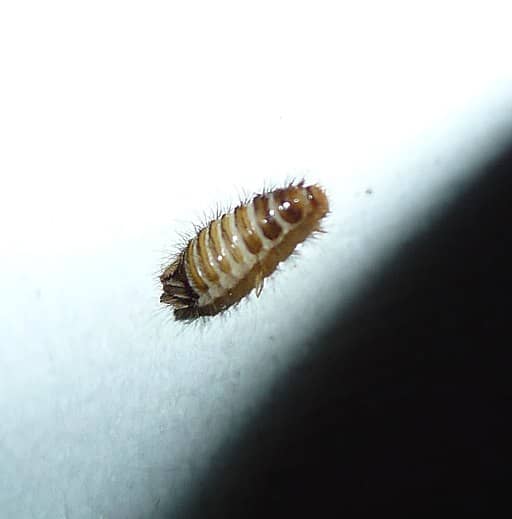
Where Do Carpet Beetles Hide?
Don’t let the name fool you—carpet beetles don’t exclusively hide in carpets. They do prefer dark, warm areas where they can lay their eggs, which include under baseboards, the forgotten areas of pantries, in closets, and the crevices of upholstered fabrics.
Dust bunnies are magnetic to carpet beetles since they feed on the dead skin cells that are part of dust clumps.
What Do Carpet Beetles Eat?
Carpet beetles eat a range of foods, but the larvae’s most destructive habit is munching on expensive natural fibers. Wool, cotton, linens, silk, and carpet are all prime food sources.
Some carpet beetles may also partake in pasta, flour, pet food, and corn meal, which is why you should always check your pantry for spoiled food when you suspect a carpet beetle infestation.
How to Spot a Carpet Beetle Infestation
Carpet beetles are very difficult to spot, since they are quite tiny, and most homeowners don’t know they have a problem until the infestation has ruined their fabric. Keep an eye out for bare spots on clothing, furniture fabric, or rugs.
It’s also worth taking a closer look at your carpet to whether any spots are visibly shorter than the others. These are likely feeding grounds for carpet beetles and indicative of large numbers of carpet beetles in the area.
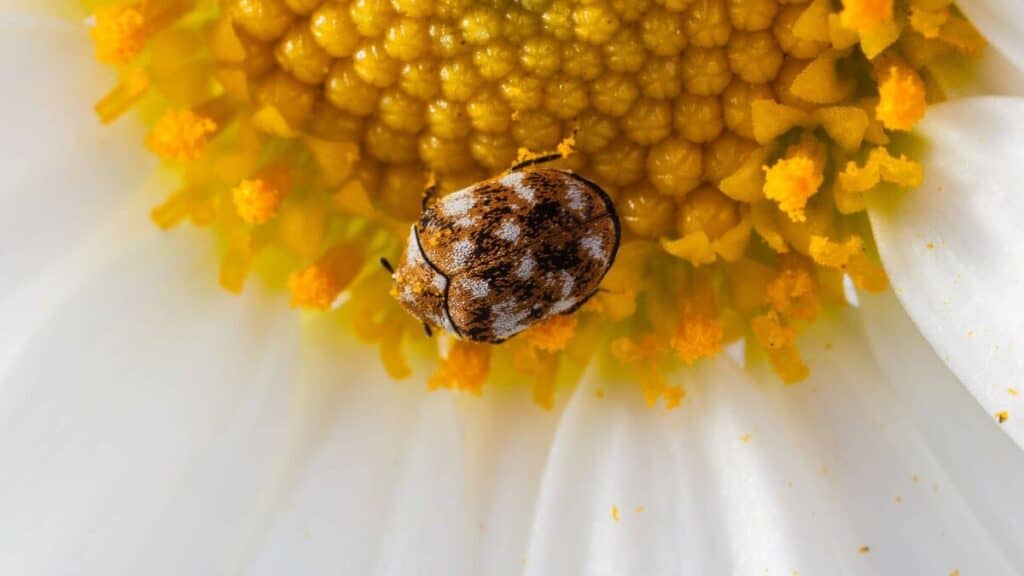
How to Deal with a Carpet Beetle Infestation
Thankfully, a carpet beetle infestation can often be handled without the need for an exterminator, but it does require regular treatment and preventative measures; leaving the job half-finished can just encourage the carpet beetles to come back stronger.
Your first step should be to treat carpets with a suitable insecticide. The carpet is the primary place where carpet beetles will reproduce, which is why an active insecticide capable of killing both adults and larvae is necessary.
You’ll want to look for an insecticide with the following ingredients:
- Bifenthrin
- Cyfluthrin
- Deltamethrin
These three are the most effective and proven market products that kill carpet beetles. It’s prudent to test these products on your carpet to make sure they won’t stain and follow any manufacturer’s guidelines regarding their use.
Keep away from cats and dogs. Alternatively, you can use boric acid, diatomaceous earth, or vinegar.
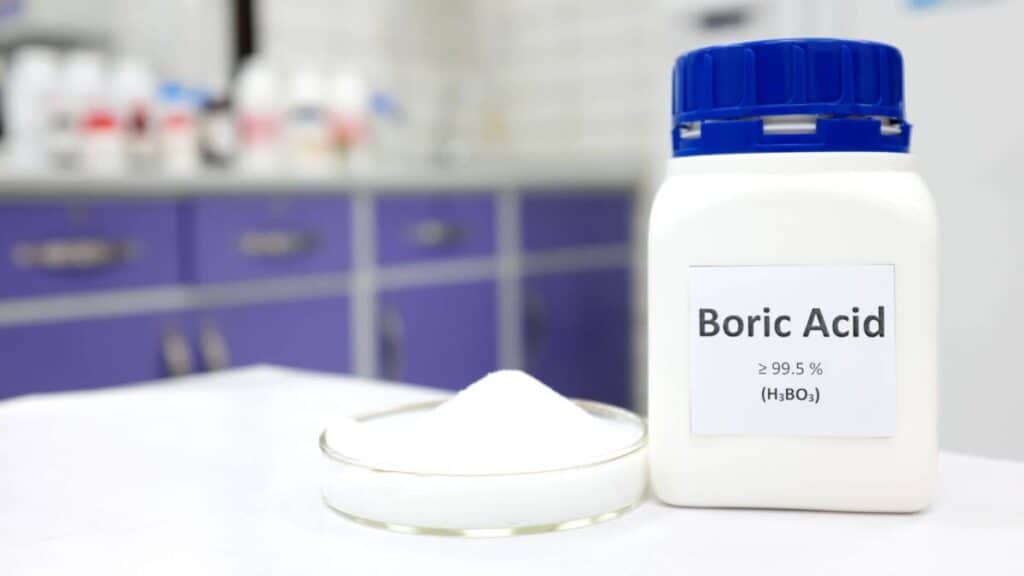
Once you’ve treated your carpet, you’ll want to thoroughly clean off your furniture and upholstery. You can finely mist white vinegar onto most surfaces to kill carpet beetles.
Diatomaceous earth is particularly effective against pantry-dwelling carpet beetles since it can be used in cabinets, pantries, and pet food cupboards safely to kill carpet beetles and discourage them from visiting.
A fogger is another tool you might be able to make use of to eradicate flying beetles, especially females on the hunt for somewhere to lay their eggs.
Catching these pesky insects in transit is a good way to keep the problem under control.
Preventative Measures
Once you’re done applying the solution to your carpets and other troublesome areas around your home, it’s a good practice to follow up on that treatment by vacuuming and steaming a few hours later.
Once the solution has dried, using the suction of the vacuum and the heat of the steamer to find beetles in the nooks and crannies is a good option.
Make sure to utilize the different attachments on your vacuum to access hard-to-reach spots. In general, regular vacuuming and steam cleaning are good preventative measures in tackling carpet beetle infestations.
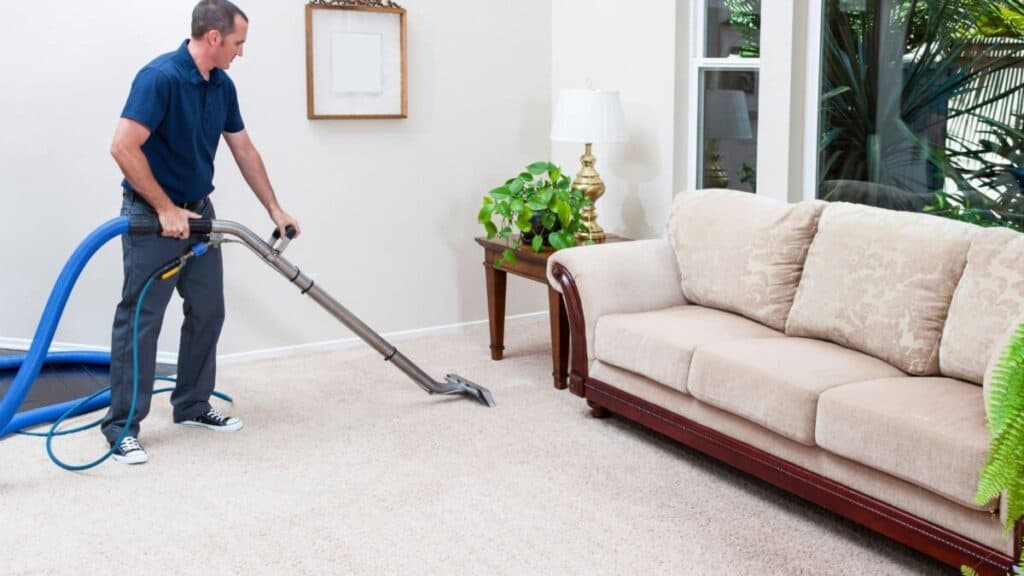
Once you’ve dealt with the problem, it’s a good idea to take some active steps to stop an infestation from occurring again.
To start, hang some flypaper traps near your windows to catch adults before they can lay eggs and start the whole cycle all over again.
Keep your clothes clean and off the floor—carpet beetles much prefer dirty clothing. It’s also a wise practice to keep all of your food (not just what carpet beetles eat) in airtight containers to stop any creepy crawlies from reaching them.
Lastly, dust, sweep, and vacuum your home regularly to keep spaces dust-free and bug-free for good.
Final Thoughts
At the end of the day, it’s going to take a much more dynamic approach to kill carpet beetles than just spraying your rugs and carpet with Lysol—it’s simply not powerful enough to get the job done reliably; however, that doesn’t mean that Lysol is entirely useless as a preventative tool against bugs.
Regularly using disinfectant wipes or spray on your surfaces makes the environment much less pleasant for bugs, removes harmful bacteria, and slows the spread of dust around your home.
Alright, that’s it for this article, here are a few hand-selected articles that you might also find interesting reads:
Carpet Beetles In Your Bedroom?!I’ve Seen One Beetle Should I Be Worried?
Tiny Brown Bugs and How to Get Rid of Them
Recent Posts
Tiny Black Bugs in Bathroom NO WINGS: What They Are and What to Do!
Finding tiny black bugs in your bathroom can be uncomfortable, to say the least. Especially if they are persistent, or they appear in very large numbers, which they often like to do. When it...
Tiny Black Bugs in Plant Soil - What Are They & What To Do About It
A short horror story: You get a new houseplant. You do your best to take care of it. You’ve ensured that it has the right soil, the right amount of sun, it gets enough water. And then one day, you...

